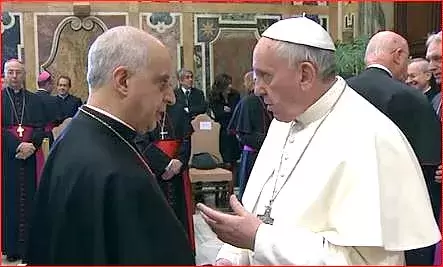POPE FRANCIS ON INSTITUTIONAL REFORM
The three Hallmarks of a curial official are professionalism, service, and holiness of life.
(Francis, 2013 address to the Roman Curia.)
(Francis, 2013 address to the Roman Curia.)
Pope Francis' reform of the institutional church is centered on the attempt to change the attitude of the clergy and laity who serve in the Roman Curia and other governing roles in the church. Its guiding principle is to bring about a spiritual and ministerial transformation of those who serve in authoritative positions in the church.
In his reform efforts Francis has pushed for some decentralization in the church. His adoption of the synodal model is perhaps the best example of his approach to decentralization. Pope Francis' movement to decentralize the church does not mean that he intends to completely abandon the need for a central level of governance in the church. Another key element in Pope Francis' vision of reform is that he has chosen to adopt a more pastoral and kerygmatic approach to preaching the Gospel of Jesus Christ rather than giving the priority to the dogmatic content of faith.
Applying this kerygmatic emphasis to the magisterium, Pope Francis reminds us that the magisterium has a "listening role" as well as an authoritative teaching role. He urges the formal magisterium to be open to hearing the faith of the laity who participate in Christ's prophetic office through the infallible "sensus fidei." The magisterium has a responsibility to listen to the people of God and preach the Gospel in a way that meets the needs of Catholics today.
John Connolly, "Pope Francis's Reform of the Institutional Church." (see article)
